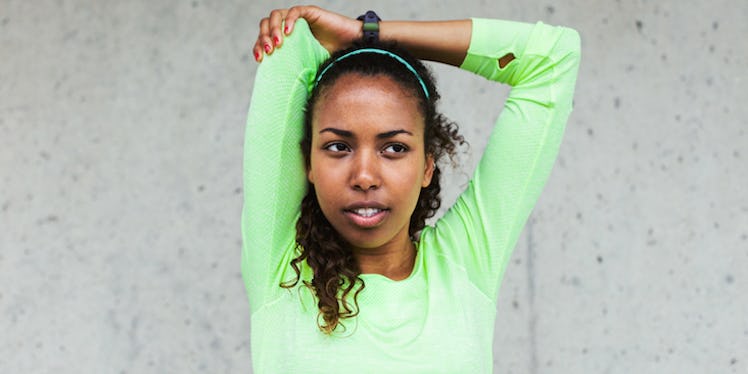
6 Reasons Why You Definitely Shouldn't Workout When You're Drunk
You know when you're headed to your Friday post-work sweat sesh, and you suddenly get a call from your friends saying you need to get to happy hour immediately?
Yeah, it's happened to the best of us. Sometimes a good sangria is the only thing standing between you and workout.
But TBH, when you're in a good workout groove, you really don't want to sacrifice the gains for a glass (or five).
So, you wonder, is it really that bad to workout when you're drunk?
Like, come on, I'm not even drunk -- casually tipsy at best!
Sorry to burst your Blue-Moon-infused bubble, but according to the American College of Sport Medicine, you should refrain from alcohol consumption before any kind of exercise.
Alcohol has a whole slew of adverse effects on performance because of its metabolic and cardiovascular effects.
Elite Daily spoke with Dr. Anthony Balduzzi, founder of The Fit Father Project, to get his perspective on alcohol's effect on overall fitness.
He says,
As enjoyable as drinking can be, our bodies view alcohol as a 'metabolic toxin' that puts stress on every major vital organ that keeps us alive. Heavy drinking will absolutely affect your ability to exercise -- along with causing [many] other harmful side effects.
Ugh. Guess I'm ditching happy hour.
Here are six reasons you're definitely going to want to skip the Cabernet before cardio:
1. Alcohol Is A Depressant
Any kind of alcohol consumption is going to affect your nervous system -- it basically acts as an anesthetic and tranquilizer.
Yummy?
This will negatively impact your reaction time in general, but especially if you're making the journey to the gym. You'll be slower and have significantly less hand-eye coordination and balance.
Balduzzi tells Elite Daily,
Exercise requires fast and efficient CNS communication (to maintain balance and contract muscles needed for exercise). Working out 'under the influence' makes exercise much less effective (and potentially quite dangerous).
I don't know about you, but I'm not trying to face-plant mid jump-lunge. It's probably best to save the beer for after burpees.
2. Alcohol Prolongs Muscle Recovery Time
Alcohol intake has been shown to impair the rates of muscle glycogen synthesis and reduce muscle protein synthesis, overall prolonging muscle recovery time.
It can also decrease the key sex hormones (testosterone and estrogen) that are essential for muscle building, fat burning, and physical fitness, Balduzzi explains.
This will also make the effects of delayed onset muscle soreness way more prominent. So, like, soreness to the max.
No thank you.
3. Alcohol Makes Navigating Gym Equipment Dangerous AF
This one kind of goes without saying, but the Smith machine is not going to be your friend after one too many sips.
And I think we can all agree a free weight to the face does not sound appealing in any way.
4. Alcohol Is A Diuretic

A diuretic is a substance that promotes the production of urine.
You're already profusely sweating from your jump squats, and on top of that, the margs you just had are going to tell your kidneys to excrete more fluid, leading to #DehydrationNation.
Hello heat stroke, goodbye gains.
5. Alcohol Takes A Little While To Reach Full Effect
The effects of alcohol take about 40 to 90 minutes to reach full effect.
You know when you're drinking with your girlfriends and you're "not even that drunk," but then you stand up to go to the bathroom a few minutes later and you're like -- oh sh*t. I am that drunk.
Alcohol stays in your bloodstream until your liver is able to process it, so the delayed drunk feeling is sure to come out to play, but on the treadmill instead of the toilet.
6. Alcohol Negatively Impacts Sleep
Your beauty rest is way more important than you'd think when it comes to your #BootyGains.
Dr. Balduzzi highlights the importance of a good night's rest:
Sleep is our body's prime time to repair damaged muscles and make the beneficial adaptations after our workouts. Alcohol decreases the special type of sleep called rapid eye movement sleep (REM), in which our bodies normally secrete growth hormone to repair our muscles, organs, and tissues.
Apparently, lower REM sleep after drinking equates to poorer recovery from exercise and those pesky fitness plateaus that everyone hates.
Bottom line: Alcohol and exercise do not mix, guys. The vodka sodas can wait until long after your workout.